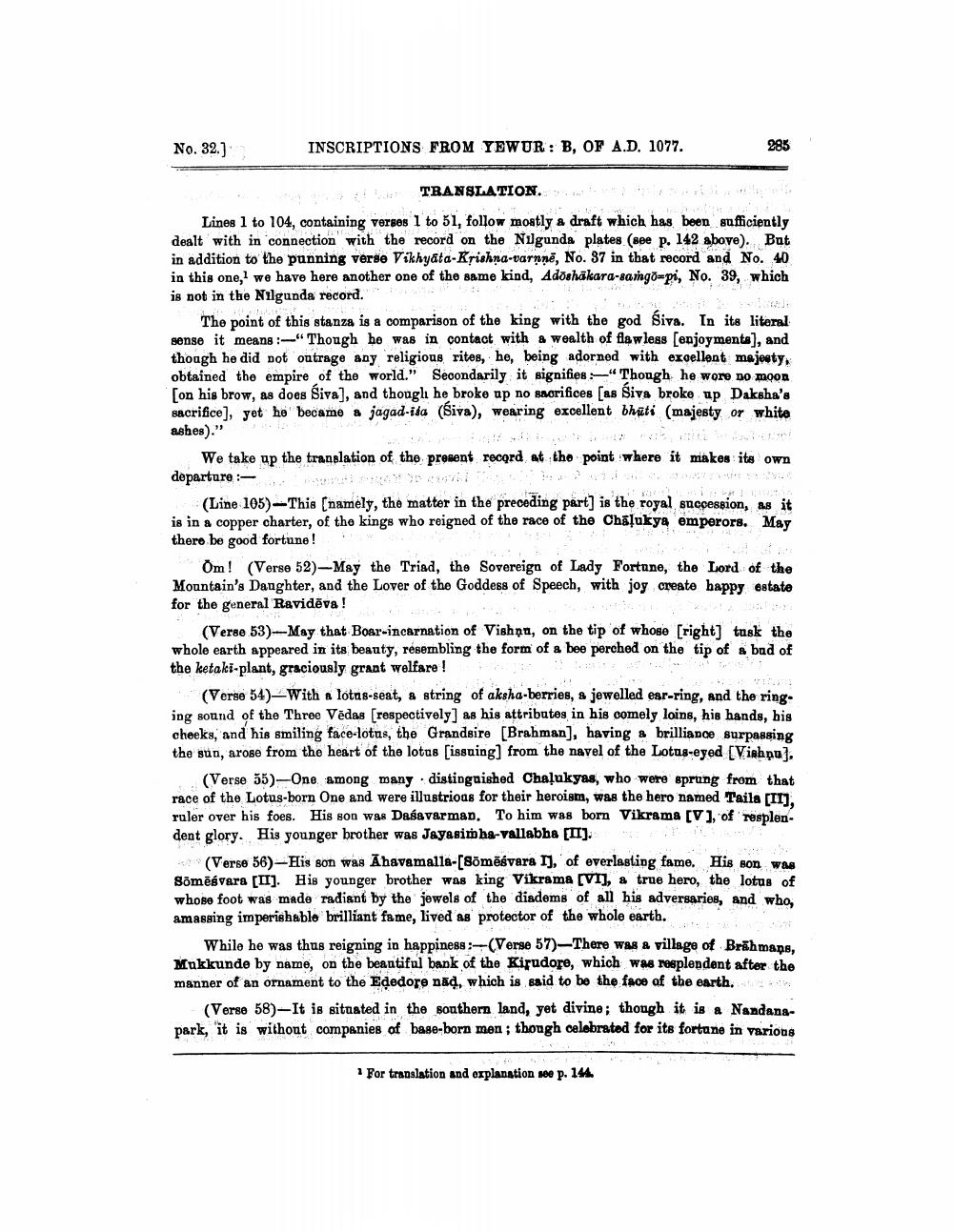________________
No. 32.)
INSCRIPTIONS FROM YEWUR: B, OF A.D. 1077.
285
TRANSLATION. Lines 1 to 104, containing verges 1 to 51, follow mostly a draft which has been sufficiently dealt with in connection with the record on the Nugunda plates (see p. 142 above). But in addition to the punning verse Vikhyata-Krishna-varnné, No. 87 in that record and No. 40 in this one, we have here another one of the same kind, Adoshākara-samgo=p, No. 39, which is not in the Nilgunda record.
The point of this stanza is a comparison of the king with the god siva. In its literal sense it means "Though he was in contact with a wealth of flawless (enjoymenta), and though he did not outrage any religious rites, he, being adorned with exoellent majesty, obtained the empire of the world." Secondarily it signifies - Though he wore no moon Ton his brow as does Siva), and though he broke up no sacrifices (as Siva broke up Daksha's sacrifice), yet he became a jagad-ida (Siva), wearing excellent bhati (majesty or white ashes)."
We take up the translation of the present record at the point where it makes its own departure :
(Line 105)-This (namely, the matter in the preceding part] is the royal sucoession, as it is in a copper charter, of the kings who reigned of the race of the Chāļukyą emperors. May there be good fortune!
Om! (Verse 52)-May the Triad, the Sovereign of Lady Fortune, the Lord of the Mountain's Daughter, and the Lover of the Goddess of Speech, with joy create happy estate for the general Ravidēva !
(Verse 53) ---May that Boar-incarnation of Vishnu, on the tip of whose [right] task the whole earth appeared in its beauty, resembling the form of a bee perched on the tip of a bad of the ketaki-plant, graciously grant welfare !
(Verse 54)-With a lotns-seat, a string of aksha-berries, a jewelled ear-ring, and the ringing sound of the Three Vēdas (respectively) as his attributes in his comely loins, his hands, his cheeks, and his smiling face-lotus, the Grandsire [Brahman), having a brilliance surpassing the sun, arose from the heart of the lotus [issuing) from the navel of the Lotus-eyed (Vishnu 7.
(Verse 55)-One among many distingaished Chalukyas, who were sprung from that race of the Lotus-born One and were illustrious for their heroism, was the hero named Taila (II). ruler over his foes. His son was Daśavarman. To him was born Vikrama [V], of resplendent glory. His younger brother was Jayasinha-Vallabha [II]. 19 (Verse 56)-His son was Ahavamalla-[8õmēsvara I), of everlasting fame. His son was Sömēsvara [II]. His younger brother was king Vikrama (VI), a true hero, the lotus of whose foot was made radiant by the jewels of the diadems of all his adversaries, and who, amabging imperishablo brilliant fame, lived as protector of the whole earth.
While he was thus reigning in happiness :---(Verse 57)—There was a village of Brahmane, Mukkunde by name, on the beantiful bank of the Kirudore, which was resplendent after the manner of an ornament to the Ededore nad, which is said to be the face of the earth.
(Verse 58)-It is situated in the sonthern land, yet divine; thongh it is a Nandanapark, it is without companies of base-born men ; though celebrated for its fortane in varions
For translation and explanation see p. 144.




